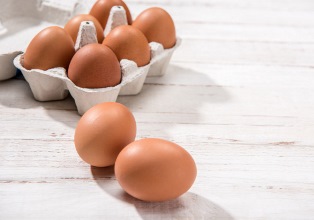Everything you wanted to know about eggs and were afraid to ask
April 13, 2017

Eggs can be the focal point of the Easter season for children and a nutritious delight for adults, says NCH’s nutrition expert Lindsay Sawyer Lim, RDN, LDN, M.B.A., M.P.H.
How to boil the perfect egg?
Place your eggs in a pot and fill water to two inches above eggs. Bring water to a boil. Once water is boiling, turn off heat and put cover on the pot (the cover is important). Let sit covered for 10 to 12 minutes. Drain water and run cool water over eggs for a minute to stop them from cooking. Enjoy!
In the war on cholesterol, are eggs really bad for you?
In recent years, research has shown that eggs are no longer on the list to avoid for cardiovascular health. Eggs are high in cholesterol, but that does not mean they will elevate your blood cholesterol levels. Saturated fat and trans fats are the major culprits for high blood cholesterol, and you should limit both to keep your heart healthy.
What is the current recommended serving of eggs each week?
There is no real recommendation, other than consuming eggs in moderation. It’s fine to have an egg every day, but not a three-egg omelet every day. Moderation is key.
How do you color eggs with natural items rather than dyes?
Use beets, turmeric, onions and more to get varying shades. Learn more in this basic egg coloring how-to guide.
How do eggs provide nutritional benefits?
Eggs are a great source of protein – around six grams for one egg. It is the cheapest way to get high biological value protein. According to the Egg Nutrition Center, eggs are one of the few foods that are a natural source of Vitamin D. They are also a great source of choline, which our cells need to function properly. Most of the egg’s nutrition is in the yolk. If you only eat egg whites, you are missing the great nutrition!
Tell us the truth. Are raw eggs really bad for you? (For example, the kind in yummy cookie dough?)
Anytime you eat an undercooked egg, including a runny yolk, you have a risk of getting salmonella food poisoning. The risk is low, but you should be extra cautious with young children, pregnant women, the immunocompromised and the elderly. Some of the pre-packaged cookie dough is made with pasteurized eggs and that helps decrease the risk. You can also purchase pasteurized shell eggs or liquid eggs and this greatly decreases the risk as well if you want to eat them undercooked.
Favorite egg recipe?
I love making breakfast burritos. You can make them ahead of time and heat them in the morning. Scramble some eggs and place in a whole-wheat tortilla. Add black beans and sautéed veggies and cheese. You can add anything that will reheat well. Enjoy within three days.